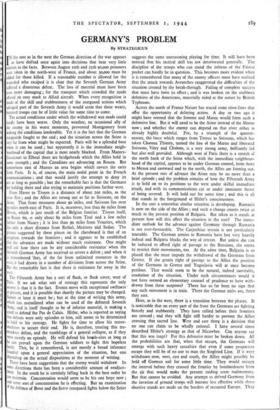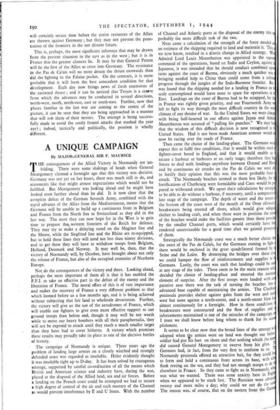GERMANY'S PROBLEM
By STRATEGICUS
N the east as in the west the German direction of the war appears I to have -drifted once again into decisions that bear very little relation to the facts. Between August loth and 25th 92,000 prisoners were taken in the north-west of France, and about 30,000 must be added for those killed. If a reasonable number is allowed for the wounded who escaped it is clear that the Seventh German Army suffered a disastrous defeat. The loss of material must have been even more damaging ; for the transport which crowded the roads offered an easy mark to Allied aircraft. When every recognition is made of the skill and stubbornness of the rearguard actions which salvaged part of the Seventh Army it would seem that these weary, battered troops can be of little value for some time to come.
The actual conditions under which the withdrawal was made could hardly have been worse. Only the weather, an occasional ally of the enemy in his worst moments, prevented Montgomery from making the conditions intolerable. Yet it is the fact that the German rearguards fought to the end ; and the situation across the Seine is very far from what might be expected. Paris will be a splendid base when it can be used ; but apparently it is the immediate neigh- bourhood of the capital that is most nearly blocked. From Mantes- Gassicourt to Elbeuf there are bridgeheads which the Allies hold in some strength ; and the Canadians are advancing on Rouen. But somewhere east of Mantes an area begins which covers the exits from Paris. It is, of course, the main nodal point in the French communications ; and that would justify the attempt to deny its use as long as possible ; but the remarkable fact is that the Germans are holding there and also trying to maintain positions farther west.
From Havre to Troyes is a distance of about zoo miles, as the crow flies ; and the Allies are strung out as far as Soissons, on the Aisne. That front measures about 90 'miles, and Soissons lies over 5a miles north-east of Paris. It is, moreover, less than 6o miles from Hirson, which is just south of the Belgian frontier. Troyes itself, on Route 6o, is only about 8o miles from Toul and a few miles farther from Nancy ; it is less than 90 miles from Vouziers, which lies only a short distance from Bethel, Mezieres and Sedan. The picture suggested by these pieces on the chessboard is that of an irruption towards the frontiers ; and it appears to be established that the advances are made without much resistance. One might well ask how there can be any considerable resistance when the Seventh German Army has received so severe a defeat ; and when it is remembered 'that, of the far from unlimited resources in the west, it had drawn in a number of divisions from across the Seine. But the remarkable fact is that there is resistance far away in the West.
The Fifteenth Army has a sort of flank, or flank cover, west of Paris. If we ask what sort of strategy this represents the only answer is that it is the fact. Events move with exceptional swiftness at present, and it is possible that shortly the picture may be changed. Sooner or later it must be ; but at the time of writing this army, which has assimilated what can be used of the defeated Seventh Army, and is itself thought to be of inferior material, is making a stand to defend the Pas de Calais. Hitler, who is reported as saying that defeats were only episodes to him, still seems to be determined to hold to his strategy. He fights for time to allow his terror- machines to secure their end. He is, therefore, treating this tre- mendous defeat, and the rumblings of a general collapse, as if they Were merely an episode. He will defend his bomb-sites as long as he can prevail upon the German soldiers to fight this hopeless battle. This, be it remembered, is not merely a broad inference founded upon a general appreciation of the situation, but one depending on the actual dispositions at the moment of writing.
There have been suggestions that the enemy would withdraw. In some directions there has been a considerable amount of readjust- ment. In the south he is certainly falling back in the best order he Can maintain. Concentration would seem to be his one hope now ; and some sort of concentration he is effecting. But an examination the defence of Brest and the fierce rearguard fights below the Seine suggests the same unreasoning playing for time. It will have been noticed that his tactical skill has not deteriorated generally. The discipline of the troops who can stand the inferno of the Falaise pocket can hardly be in question. This becomes more evident when it is remembered that many of the enemy officers must have realised that the attack towards Avranches exaggerated the difficulties of the situation created by the break-through. Failing of complete success that must have been its effect ; and it was broken on the stubborn defensive of the Americans, materially aided at the outset by British Typhoons.
Across the north of France Nature has traced some river-lines that offer the opportunity of delaying action. A day or two ago it might have seemed that the Somme and Marne would form such a defensive line. But it will need to be the Aisne instead of the Marne now ; and whether the enemy can depend on that river either is already highly doubtful. For, by a triumph of the quarter- master, the force which ranges from Troyes to Soissons, which has taken Chateau Thierry, turned the line of the Marne and liberated Soissons, Vitry and Chalons, is a very strong army, brilliantly led but Also well provided. Although west of Paris there is a stretch of the north bank of the Seine which, with the immediate neighbour- hood of the capital, appears to be under German control, from there to Meaux and eastward and to the north, the Allies are fanning out. At the present rate of advance the Aisne may be no more than a brief episode ; and the problem remains of how the Fifteenth Army is to hold on to its positions to the west under skilful immediate attack, and with its communications cut or under imminent threat of being severed. It will hold out for some time ; and this is all that stands in the foreground of Hitler's consciousness.
In the east a somewhat similar situation is developing. Rumania is now on the side of the Allies ; and such a change counts twice as much as the present position of Bulgaria. But taken as it stands at present how will this affect the situation in the east? The imme- diate outlook for the advance against Germany through Rumania is not over-favourable. The Carpathian terrain is not particularly tractable. The German armies in Rumania have lost very heavily indeed and Bulgaria blocks the way of retreat. But unless she can be induced to afford right of passage to the Russians, she seems to restrict their movements, too. At the same time, Bulgaria is so placed that she must impede the withdrawal of the Germans from Greece. If she grants right of passage to the Allies the position of the Germans in Greece and Yugoslavia will at once become perilous. That would seem to be the natural, indeed inevitable, resolution of the situation. Under such circumstances would it not have seemed an elementary counsel of prudence to have with- drawn from these outposts? There has so far been no sign that any such movement is in train. There the German units are, there. they rest.
Here, as in the west, there is a transition between the phases. It is noticeable that on every part of the front the Germans are fighting fiercely and stubbornly. They have rallied before their frontiers are crossed ; and they will fight still harder to prevent the Allies crossing that sacred line. West and east there is a decision that no one can claim to be wholly rational. I have several times described Hitler's strategy as that of Micawber. Can anyone say that this was inapt? For this defensive must be broken down. All the probabilities are that, when that occurs, the Germans will emerge with such heavy casualties that even if some proportion escape they will be of no use to man the Siegfried Line. If it were withdrawn now, west, east and south, the Allies might possibly be held off German soil for some little time. They would occupy the interval before they crossed the frontier by bombardment from the air that would make the present raiding seem rudimentary. But that cannot be avoided. Any attempt to defend Germany from the invasion of ground troops will become less effective while these abortive stands are made on the borders of occupied Europe. They will certainly secure time before the entire resources of the Allies are thrown against Germany ; but they may not prevent the pene- tration of the frontiers in the not distant future.
This is, perhaps, the most significant inference that may be drawn from the present situation in the east as in the west ; but it is in France that the greater chances lie. It may be that General Patton will be the first of the Allies to cross into Germany. The resistance in the Pas de Ca!ais will no more detain the thrust eastwards than did the fighting in the Falaise pocket. On the contrary, it is more probable that it will form the best antecedent condition for that development. Each day now brings news of fresh extensions of the eastward thrust ; and it can be noticed that Troyes is a centre from which the advances may be conducted in several directions, north-west, north, north-east, east or south-east. Further, now that places familiar in the last war are coming to the centre of the picture, it can be seen that they are being approached in a manner that will rob them of their terrors. The attempt is being success- fully made to avoid the costly frontal attacks that marked the year 1917 ; indeed, tactically and politically, the position is wholly different.



























 Previous page
Previous page